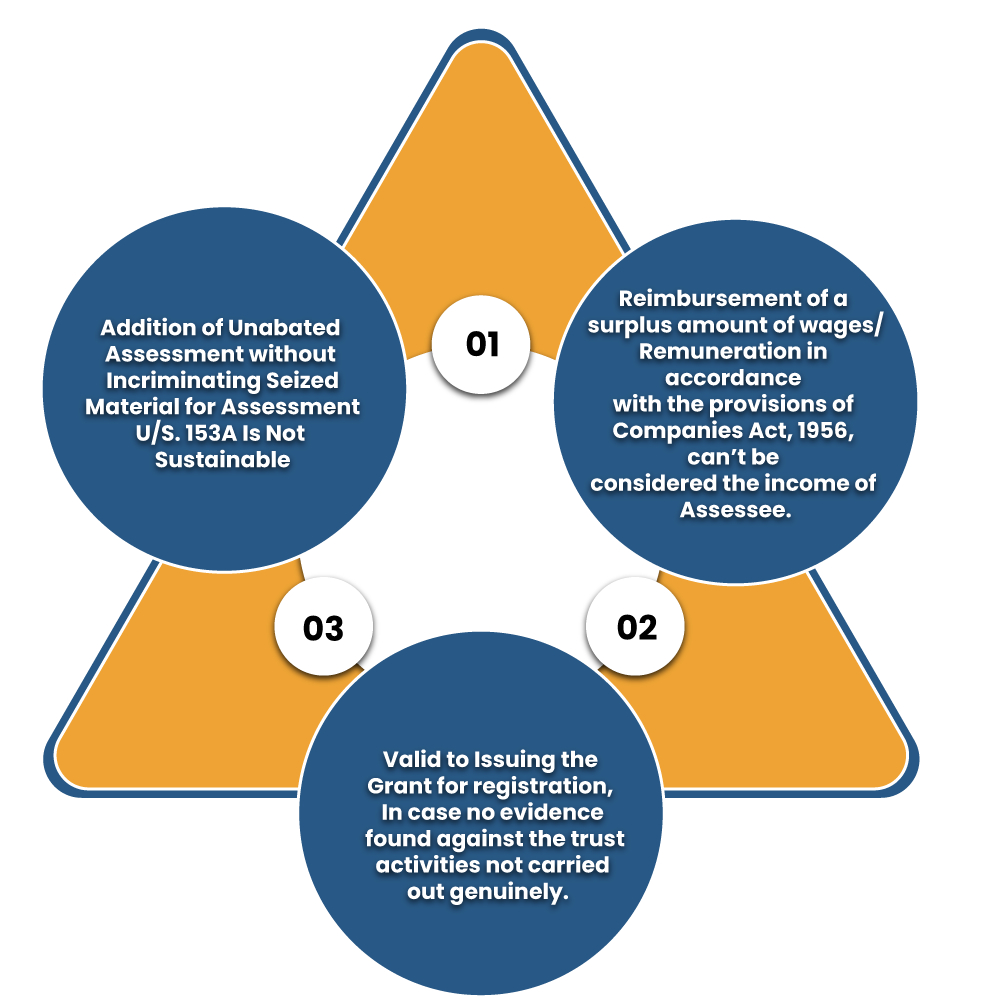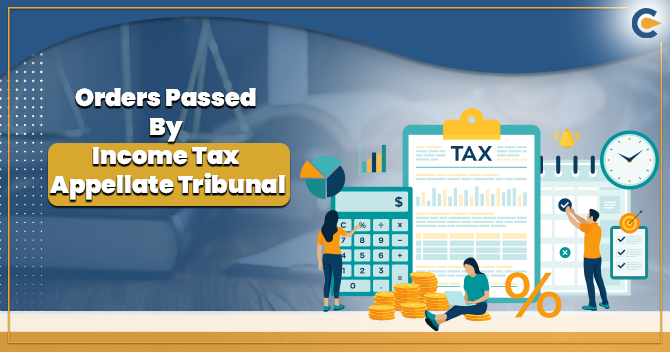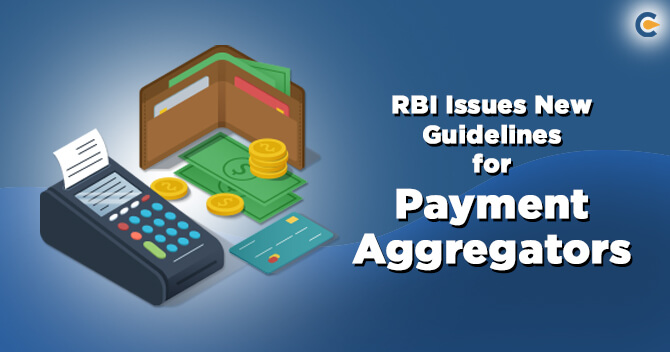The Income Tax Appellate Tribunal was constituted on 25 January 1941 on the basis of Section 5A of the Income Tax Act, 1922. Since its establishment, ITAT has been working very hard leaving significant changes due to the expansion & extension of its jurisdiction.
The Income Tax Act, 1961 has not made any specific changes in the constitution or in the functioning of tribunals. There is no doubt about the fact that the functioning of Income Tax Appellate Tribunal has contributed towards the development of other Appellate Tribunals. The following are the various orders passed by the Income Tax Appellate Tribunal this month.


Addition of Unabated Assessment without Incriminating Seized Material for Assessment U/S. 153A Is Not Sustainable
The Income Tax Appellate Tribunal (ITAT), Mumbai Bench held that the addition of unabated assessment without incriminating seized material for inspection under section 153A is not sustainable.
Party Name
Shri Dinesh Salecha (Appellant) versus Dy. Commissioner of Income Tax Central was Respondent
Facts of the case
The assessee being an individual, filed her income tax return for an assessment year 2008-09 on dated 31st July 2008, declaring total income of 3, 90,830. On dated 11 June 2103 a search and seizure action was taken against the RSBL group under section 132 of Acton, and the assessee was also covered.
The notice under section 153 A of the Act was issued. The assessee under section 143(3) r/w section 154A of the Act was completed in the case of all the years on dated 28th march 2016, on an income of 29,50,830 (A.Y. 2008-09); 45,76,360(A.Y 2009-10) and 30,16,628 (A.Y. 2011-12).
Issue of the Case
Whether the assessee can challenge the jurisdiction of assessment in terms of section 153A in respect of any search material?
Order Passed
The Coram of the house including of Ram Lal Negi and Shamim Yahya while setting aside the orders and deleting the additions noted that the addition made in the assessment orders passed by the assessing officer under section 153A without reference to any incriminating material found search is not sustainable has also been expounded by the Supreme Court in the case of CIT v/s Singhad technical education Society.
Interpretation
In other words, the reference is to that assessment in whose case assessment under section 143(3) cannot now be done. It is not at all the case of the revenue that in appeals which have been claimed as unabated here there was time for assessment under section 143(3).
In this view of the matter, in our considered opinion, the submission of the learned council of the assesee succeeds that the addition in case of unabated assessment without reference to incriminating seized material for assessment/s 153A is not sustainable on the touchstone of above said Hon’ble Jurisdiction H.C decision.
Read our article:The New Income Tax Slab Determines on Salary of Rs. 8 Lakhs and Rs 10 Lakhs Per Annum
Reimbursement of a Surplus Amount of wages/Remuneration in accordance with Companies Act, 1956, can’t be considered the Income of Assessee
The Bench of the Income Tax Appellate Tribunal (ITAT), Ahmadabad held that the excess amount of remuneration refunded as per the provisions of the Companies Act, 1956[1] cannot be held as income of the assessee.
Party Name
Vadodra (Appellant) versus Rajamannar Thennati (Respondent)
Brief Facts of the Case
The assessee, Rajamannar Thenti as a full-time director of the company was employed with Sun Pharma Advance Research Company Limited for a maximum of Rs. 3.5 crores in accordance with the resolution precede under the annual general meeting of the company.
Since there, was a limit for payment of wages/remuneration to a full-time director as per the Companies Act, 1956, the company has made an application to the Ministry of Corporate Affairs, Govt. India to approve full-time director’s salary as per the resolution passed at the annual general meeting on dated 31st July 2012.
However, Government of India has approved the salary of the full-time of director for a short period of time. The company had given a second application to the central government to approve the additional salary; and there was no response from the central government.
Issue of the Case
Whether the refund of salary can be considered as income accessible to tax or not?
Order Passed
The coram of Mahavir Prasad and Amarjit Singh considered that the refund was done only for the purpose of complying with the provisions of the Companies Act, 1956. Therefore, in view of the legal requirement contained in the provisions of the Companies Act, 1956 while upholding this order, the assessee has returned the excess amount of remuneration.
Grant for registration, if no evidence found against the trust activities not carried out genuinely
The Hon’ble Income Tax Appellate Tribunal (ITAT), Bangalore bench held that the application for registration to be granted in case no satisfactory evidence found by them that clearly showing the acts of the trust are not performed genuinely.
Brief Facts of the Case
- The assesse, trust ‘Teachers Academy Education’ came in existence under the Deed of Trust.
- The vision of the trust to establish educational establishments in order to provide professional, technical information technology, medical, and general education trainings starting from the nursery, secondary to degree level educations.
- A survey conducted within the premises of the assessee and it came to notice before the concerned authority that the assessee has not obtained any of the registration under section 12AA of the Act and yet not filed any income tax returned past 7 years.
- The above said findings further communicated by the concerned DDIT (Inv.) who authorized to conduct a survey through the Assessing Officer.
- Under Legal guidance, the assessee filed an application for a grant of registration under section 12 A of the act.
- The assessee applied Form 10A for registration under section 12AA of the Act. The assessee also made the income tax returns for Assessment Years 2016-17 and 2017-18.
- The assessee filed in anticipation of the grant of registration and also claimed exemption under section 11 in respect of surplus of income over expenditure for the aforesaid assessment years.
- The CIT (E) rejected the request and denied the grant of registration.
Issue of the Case
Whether the assesse grant pre-requisites for registration under section 12A of the Act and hence the registration should be approved.
Order Passed by the ITAT
The ITAT observed that the assessee has also given clarification on other aspects which will have an impact on the grant of registration under Section 12A of the Act. In the impugned order, CIT (E) has neither dealt with those materials nor has it got those materials correct. Under these circumstances, the ITAT observed that the assessee should be given the benefit of registration under section 12A of the Act.
Conclusion
Under the orders passed by the concerned ITAT authority related to the grants for registration and allowing or disallowing the assessee under the valid findings pieces of evidences against its questionable activities clearly seems that the ITAT is one of the higher authority under whom the issue related to tax are conferred for justice and in case someone not satisfied with the verdicts of the said authority can move further. Kindly associate with the Corpbiz expert in order to know more about the important orders passed by Income Tax Appellate Tribunal (ITAT).
Read our article:What are the Legal Liabilities meant under Income Tax for Minors?











